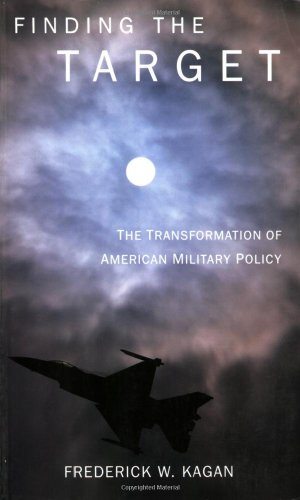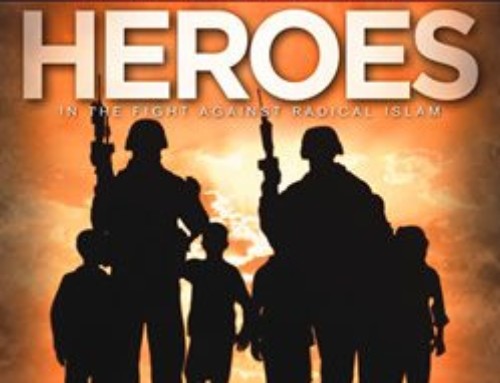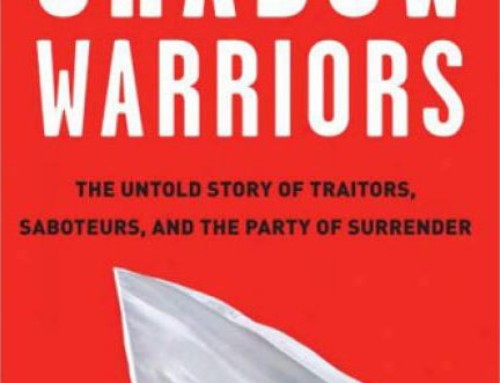Can anyone imagine Ronald Reagan appointing a blue-ribbon panel, partly comprised of his political enemies, and ordering it to produce a report that would tell him how to deal with the Soviet Union? Perhaps the most odious aspect of Iraq Study Group report was that it linked the Israeli-Palestinian conflict with our decision to remove Saddam Hussein from power, as if both were imperialist depredations of the Middle East, wrongs for which America must atone. And in so doing, the report not only sold out our troops lost in this war and those still there fighting, but it sold out Israel, our most trusted ally in the region. It was good news for those of us who hope our children and grandchildren will be able to enjoy the benefits of still free Western Civilization to see the report and its messengers mostly repudiated.
Our Base Must Not Go Wobbly Now
A recent op-ed, The Iraq Commission Can’t Undo the Failures of Others, written by the Chicago Tribune’s Steve Chapman, is indicative of what many Americans, some even in conservative circles, can’t understand about the forces at play in Iraq.
Historians have observed that many of the great civilizations of the past didn’t just fall to superior armies. They essentially committed suicide. Chapman’s piece is indicative of an alarmingly widespread suicidal misperception here in the West that holds that we can somehow retreat and talk our way out of the realities associated with 9/11, realities such as an ascendant militarized Islam and its state-sponsored jihadists, the danger of a Western Europe slipping into the Middle East orbit and the looming threat of a nuclear Iran. His essay is filled with false assertions built upon rewritten bogus history so much so that I nearly had to wonder if Chapman hadn’t already purchased his prayer rugs. But here is the good news and a theme I will return to often in these columns—facts are stubborn things.
Stubborn Facts
Echoing what some former supporters of the Iraq War are now averring, Chapman writes, “the invasion was a doomed enterprise from the start.” Really? The U.S. military removed the Iraqi regime, subduing organized resistance in 18 days and did so with an amazingly low loss of life, an unprecedented military and humanitarian event in all of human history. Iraq has now held three free and fair elections and the percentage of people who turned out to vote is greater than in the United States. Saddam Hussein is not running a terrorism university south of Baghdad (try Googling Salman Pak to learn about the thousands of terrorists he was training his training camp in Iraq). And Iraq is not diverting billions to Security Council members through the oil-for-food program so as to get sanctions lifted which would have allowed Saddam to continue making WMD’s that he used so effectively in his war against Iran and against his own people. In short, the good news is that the American led coalition of countries has accomplished much, is much closer to success than failure and has no need to make apologies to anyone including our own American left.
From a geographic standpoint the country is mostly pacified. The current hostilities are largely the product of assorted left-over Baathists and freelance jihadists who’ve infiltrated the country from other Islamic countries who are being funded and supplied munitions by Iran and Syria. The bulk of Iraqi’s want us to stay. The good news is that we have freed millions of Iraqi Kurds, Iraqi Shiites and women from a despotic rule and created a vast pool of potential intelligence operatives vital to our future success.
The Lawrence of Arabia Corollary
What no Western leader from either the political or diplomatic communities will likely ever say publicly, even the largely reviled necons won’t say, is that one of the tactics that is in play in Iraq is aimed at the larger war against international, state-sponsored terrorism and is the one used by the Allies in World War I to dismantle the Germany ally, the Ottoman empire. At the outbreak of the Great War, the Ottomans retained a hold on modern Turkey, Syria, Jordan, Lebanon, Palestine, and the Arabian Peninsula.
The British field operation mounted to defeat the Ottomans was staffed by a brilliant Oxford-educated Arabist, T.E. Lawrence, whose fame was renewed by Hollywood and whose task it was to train, equip and most importantly inspire the Arab revolt. At the outset, he organized and commanded a few thousand primitive Islamic Bedouin horse and camel-mounted warriors to fight a guerilla war against a vastly larger mechanized army of Islamic Turks. Essentially, he became a field commander in an operation that pitted Islamic freedom fighter against Islamic overlord, an operation which dispatched to history the militant Islamic Ottoman Empire, a civilization that only 200 years earlier threatened to conquer all of Europe. (More on this all-important, largely forgotten piece of history in my next edition.)
By the spring of 1918, as the war in the Middle East began to cascade down against the hated occupying Turks and Germans, Lawrence’s Bedouin army was swelling in numbers. The Bedouin were emboldened and now ready to attack head on their retreating overlords. What was left of the German and Turkish armies headed north into Syria, quitting their Mediterranean and Red Sea cities and strongholds, which they had held for 500 years. While in pursuit, Lawrence’s diary records that his Bedouin cavalry came upon a small village named Tafas, where all the Arab inhabitants, men, women and children had been brutally massacred by the embittered vanquished Germans and the Turks. For the first time in his command, Lawrence gave the order to attack the enemy and to take no prisoners. Perhaps what passes for failure in Iraq is just due the fact that we have not been ruthless enough. Perhaps the freelance jihadists and militia members simply don’t fear us enough.
The issue of how much force needs to be applied is, for the experts, running this war. (Harry Reid has even come out with a qualified support for more troops.) But the concept of using Islamic freedom fighters to fight Islamic overlords, those who are today’s state sponsors of terror, is a proven strategy. And the good news is that it is at work now in both Iraq and Afghanistan and must be used to dilute fundamentalist Islam’s essential aggression toward the West in new not fewer theaters.
Vast Numbers of Intel Operatives Needed
 In Frederick Kagan’s new book, “Finding the Target: The Transformation of American Military Policy,” he makes the point that it is not sufficient that we affect lightning fast victories as we did in Afghanistan and Iraq if, years later, we’re still losing soldiers to primitive suicide bombers and improvised explosive devices. What is also necessary is human intelligence and know how, men and women with intimate knowledge of the enemy, its culture and its language, and most importantly with the ability to infiltrate terrorist cells. The good news is that we have the resources. Our budget for intelligence gathering among all agencies is $30 billion annually. The other good news is that with the liberation of Afghanistan and Iraq, we now have access to vast pools of manpower necessary for forward intelligence gathering vital to the war on terrorists and their state sponsors.
In Frederick Kagan’s new book, “Finding the Target: The Transformation of American Military Policy,” he makes the point that it is not sufficient that we affect lightning fast victories as we did in Afghanistan and Iraq if, years later, we’re still losing soldiers to primitive suicide bombers and improvised explosive devices. What is also necessary is human intelligence and know how, men and women with intimate knowledge of the enemy, its culture and its language, and most importantly with the ability to infiltrate terrorist cells. The good news is that we have the resources. Our budget for intelligence gathering among all agencies is $30 billion annually. The other good news is that with the liberation of Afghanistan and Iraq, we now have access to vast pools of manpower necessary for forward intelligence gathering vital to the war on terrorists and their state sponsors.
In the 4th century B.C., a 21-year-old Macedonian general with less than 30,000 soldiers, traveling on foot, conquered the entire Persian Empire and subdued the entire Middle East. For Chapman and others to maintain that we can’t subdue Bagdad is to maintain that this country that led the conquest of Imperial Japan and Nazi Germany is no longer a great power.
In Chapman’s attempt at a clever summation he writes, “The Iraq study group can be criticized for not offering a reliable path to victory. But that’s like blaming Noah for the flood.”
No, Mr. Chapman, that’s like blaming the Iraq Study Group and people like you for acting the part of Neville Chamberlin and for emboldening our enemies such as the new Iranian reincarnation of Adolf Hitler. The hard and bitter truth is the path to victory is not through further negotiation, capitulation, retreat, or appeasement. It runs through Tehran and Damascus.
NOTE: Publication: Human Events




